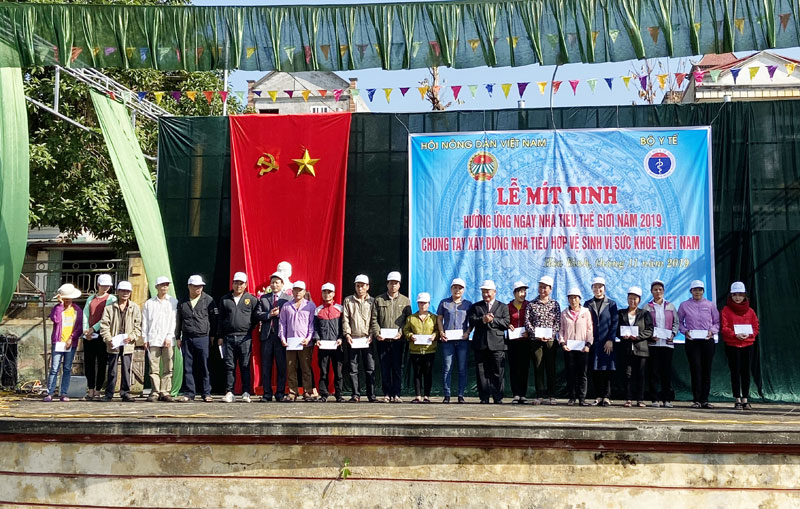
(HBO) - On November 15th, in Dung Phong Commune (Cao Phong), Vietnam Farmers’ Union and the Agency of Environmental Management, the Ministry of Health collaborated with the Provincial Farmers' Union to organize a meeting to respond to the World Toilet Day, November 19th.
The representatives of the People's Committee of the province, Vietnam Farmers’ Union and the party committee of Cao Phong district have donated money to support 20 households of the Union members in 11 communes and the town of Cao Phong district without the hygienic latrines.
The representatives of the Agency of Environmental Management, the Ministry of Health, the leaders from Vietnam Farmers’ Union took part in the meeting. From the provincial side, Mr. Bui Van Cuu, the Vice Chairman of the Provincial People's Committee, the leaders of other departments, and appropriate authorities from the province, from Cao Phong district and 310 farmers coming from 11 communes and the town of Cao Phong district also attended the meeting.
This year, the purpose of the World toilet day is "Hygiene to improve people's health”. The aim is to call for the attention and priority of the committees and authorities for the rural sanitation and to promote the cooperation and the coordination to raise the people's awareness, calling for building and using hygienic latrines. According to the report of the Department of Health, up to September 2019, there is a total of 213,066 households in our province, the households with latrines are 210,616 (accounting for 98.85%), of which the number of households with hygienic latrines is 78.45 %.
Due to the low awareness and habits of personal hygiene and environmental sanitation, especially the construction, there are still some households who do not pay much attention to using and preserving hygienic latrines. The indiscriminate defecation still exists in some rural areas, which is one of the causes of diarrhea and pneumonia, two diseases that can be fatal.
At the meeting, the representatives of the People's Committee of the province, Vietnam Farmers’ Union and the Party Committee of Cao Phong district gave money to support 20 households in 11 communes and the town of Cao Phong that do not have hygienic latrines. The support is 1 million VND each household to build the hygienic latrines, contributing to ensure the family sanitation and improve the local rural environment.
The Department of Education and Training of Hoa Binh province held a conference on March 18 to review the performance of the "Safe and Happy School" Project and set out tasks for 2025. The project, funded by the Taiwan Fund for Children and Families (TFCF), aims to create a safe, inclusive, and supportive learning environment for students. The event saw the attendance of representatives from the TFCF and 26 beneficiary schools.
With over 70% of their workers being women, trade unions across industrial parks (IPs) in Hoa Binh have been actively safeguarding their legal rights and interests while implementing initiatives to improve their income and well-being.
In recent years, the Hoa Binh provincial General Hospital has continuously innovated itself and improved the quality of medical services to meet the increasing needs of local people. With substantial investments in infrastructure and modern equipment, along with a team of highly qualified doctors and nurses, the hospital has gradually established itself as one of the leading medical units in the Northwestern region and a trusted destination for healthcare for people inside and outside the province.
From mastering the fundamentals of programming to achieving national recognition, the Programming Club of the Le Van Tam Primary School (STAR LVT28) in Hoa Binh city has made remarkable strides in the field of robotics.
The Ho Chi Minh Communist Youth Union Committee and the Vietnam Youth Federation chapter of Hoa Binh province organised a programme on March 12 to launch the "Digital Literacy" movement and an online quiz on the resolutions of the Vietnam Youth Federation congresses at all levels, as well as the Politburo's Resolution No. 57-NQ/TW on breakthroughs in the development of science, technology, innovation, and national digital transformation.
As climate change grows more unpredictable, the development of production forests has become essential - not just for economic growth, but for safeguarding the environment and maintaining ecosystem balance. By boosting local incomes, curbing natural disasters, preventing soil erosion, and protecting water resources, these forests play a crucial role in sustainable development.



